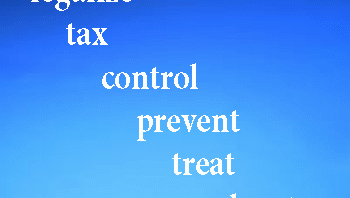10 goals for controlled re-legalization
As the drug policy reform movement gains traction around the world, it is critical that it reaches beyond its activist core and constructively address the legitimate concerns of the general public, as without its support, we are doomed to failure. The burden of proof is clearly on the drug-reformists side, as they need to overcome 100 years of official propaganda, moral panicking, fear mongering and brain washing. It is critical to be well informed, realistic and pragmatic, with clear objectives. This is one of the purposes of “World War-D”.
Therefore, I propose the following hierarchy of goals for controlled re-legalization:
- To greatly reduce, dismantle and if possible eliminate the illegal drug market. To reduce the presence and influence of organized crime. To reduce drug-related crime. The dismantling and elimination of the illegal drug market requires the dismantling of the prohibition system that created it in the first place.
- To reduce harm to existing users through safe and controlled legal access. To reduce the number of abusers/addicts; to reduce drug related deaths; to improve the health of remaining users/addicts; to improve their social integration.
- To reduce or eliminate the financial burden placed on taxpayers by the consequences of drug use and drug prohibition. To achieve taxpayer neutrality.
- To reduce initiation, especially among minors. Long-term improvements are predicated on substantially curbing initiation.
- To control and greatly minimize access to minors; eliminating access to minors altogether might be a laudable goal, but it is about as realistic as absolute sexual abstinence to reduce teen pregnancy.
- To reduce harm caused by problematic users to their proximate environment and to society at large.
- To prevent as much as possible moderate, responsible users from becoming problem users.
- To place reasonable access restrictions to the most damaging substances for new users and casual users.
- To acknowledge the legitimacy of the non-medical use of psychoactive substances and the potential danger of their abuse.
- To respect the civil liberties and lifestyle choices of informed, consenting adults as long as these choices do not intentionally endanger others. To end discrimination against users of psychoactive substances.
I believe these are realistic and attainable goals provided that the right policies are put in place. Unlike the fairly rigid prohibitionist model, there should be a lot of flexibility in the application of drug reform to allow for experimentation and adaptation to local realities. It should be obvious by now that those who wish to use psychoactive substances will go to great lengths to satisfy their desire, and it is far more advantageous for society to satisfy their need than to let the black market take care of it. The guiding concern shouldn’t be whether it is moral or immoral to provide psychoactive substances to those consenting adults who which to use them, but what is the least harmful way to do it.

